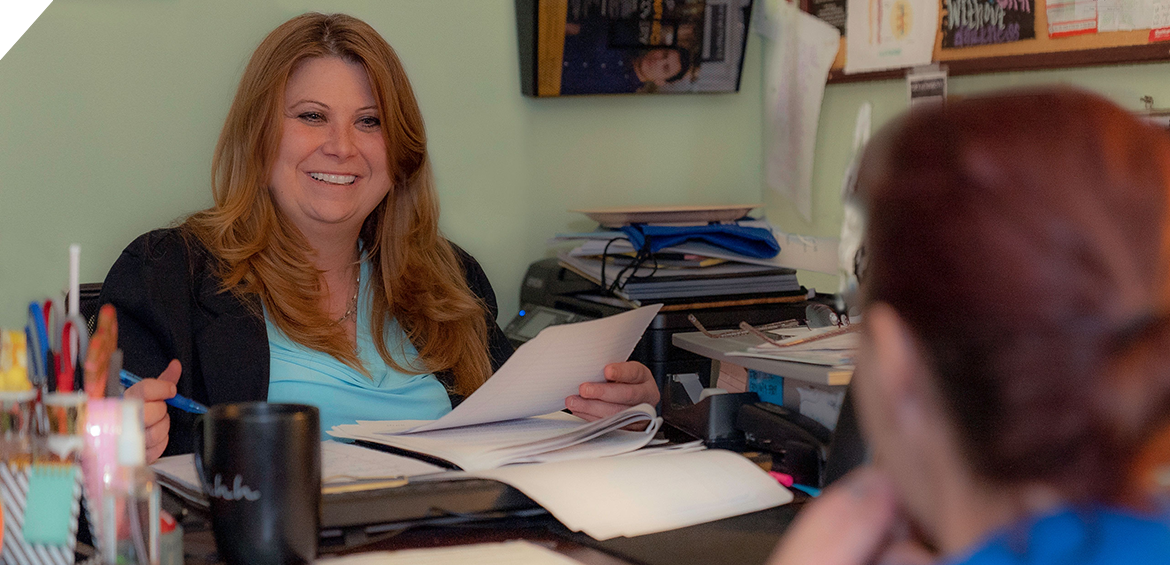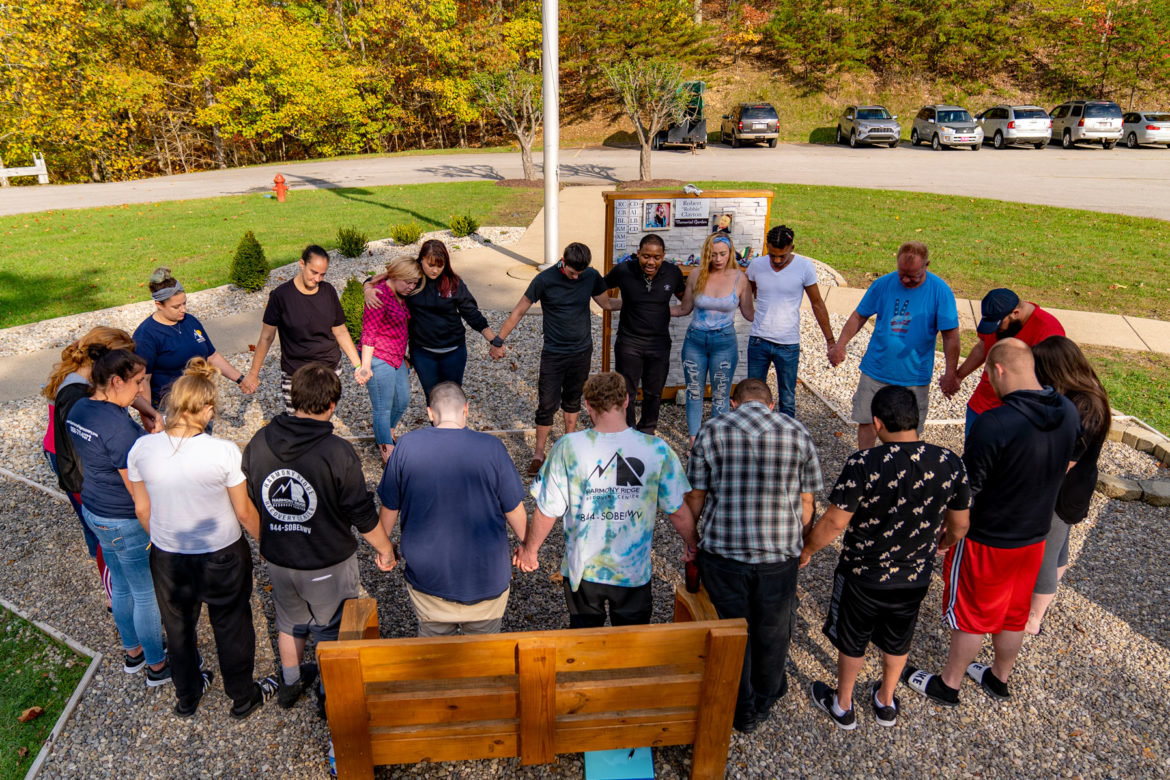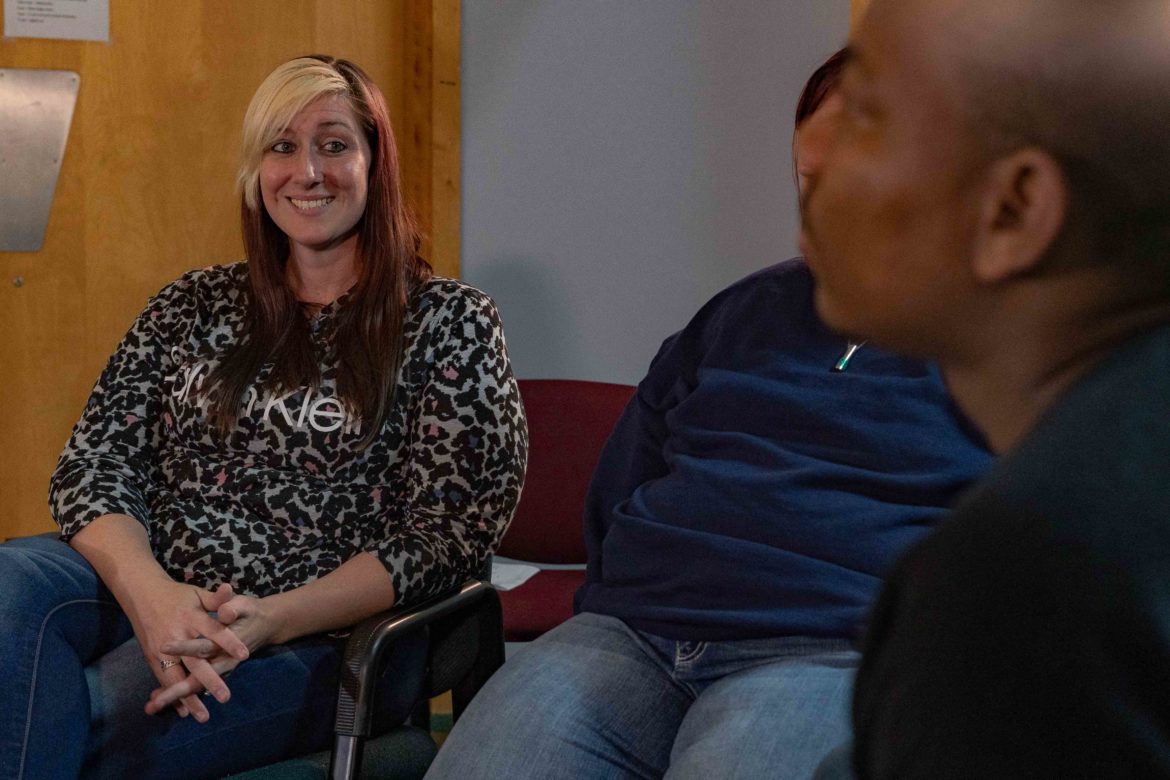Aftercare Programs
Following treatment, Harmony Ridge provides aftercare support to ensure continued success in your recovery journey.
Addiction recovery is a long-term process that will continue for many years after treatment. Aftercare programs for substance abuse are any ongoing care once a person leaves treatment. The most common forms of aftercare include 12-step programs, outpatient treatment, therapy, and sober living.
Developing an aftercare plan allows individuals to prepare for any future challenges and risks to their sobriety. Involving friends and family members in the aftercare process can increase the chances of continued sobriety. When friends and family are involved, they learn how to support sobriety, celebrate successes, and encourage healthy behaviors.
What is an Aftercare Plan?
Aftercare is a plan to support someone through recovery, prevent relapse, and work toward future goals. An aftercare plan includes resources, interventions, and activities to help those in recovery cope with triggers, cravings, and stress they may encounter. Your aftercare plan will vary from one person to the next, depending on their individual needs.
aftercare plans may include:
- Relapse prevention tools
- Attending 12-step meetings
- Obtain a sponsor
- Attending individual therapy/group therapy
- Staying in a sober living facility
- Participation in alumni programs
It is crucial to have an aftercare plan, especially in early recovery, to help prevent relapsing. The risk of relapse is at its highest in the first few months after treatment. 40 to 60 percent of individuals in recovery from drug and alcohol addiction will relapse at some point.
Developing an aftercare plan before leaving treatment can help make you part of the 40 to 60 percent that does NOT relapse. A complete and thorough aftercare plan can give you the freedom of mind to focus on the issues surrounding your addiction.
Effective Aftercare Programs for Substance Abuse
As a person’s time in treatment comes to an end, their therapist will help them develop an aftercare plan. An aftercare plan will consider all your needs; housing, employment, and continued treatment if needed. A person’s continued treatment needs will also be based on their progression in substance abuse treatment.
Once all a person’s needs have been decided on, their therapist will help find community and online resources to address the needs. Aftercare programs can last for weeks, months, and even years, depending on the individual’s needs. It is recommended that people stay actively engaged in aftercare programs for a minimum of one year after leaving inpatient treatment.
12-Step Programs
A 12-step group is a group of like-minded individuals founded on the 12 steps of recovery. 12-step programs are peer-led by others in recovery. There are a variety of 12-step meetings help at churches and community centers as well as treatment centers.
12-step programs include:
- AA – Alcoholics Anonymous
- NA – Narcotics Anonymous
- CA – Cocaine Anonymous
- MA – Marijuana Anonymous
Support Groups
SMART Recovery, founded in 1994, is an alternative to transitional 12-step programs. Based on a 4-step process that uses cognitive therapy. Cognitive therapy helps change one’s thinking to manage their emotions. The 4-step process is:
- Building and maintaining motivation
- Coping with urges
- Managing thoughts, feelings, and behaviors
- Living a balanced life
Recovery is an ongoing process, and support groups can be vital to relapse prevention.
Individual Therapy
It is crucial once people enter the aftercare process to find an addiction therapist. An addiction therapist offers education, support, guidance, and monitoring during the aftercare process. Continuing in individual therapy in aftercare can help hone the skills learned in treatment to prevent relapse.
Cognitive Behavioral Therapy
Cognitive behavioral therapy (CBT) helps individuals understand negative thinking and how it affects their behavior. CBT will help individuals develop healthy, positive thinking and increase their chances of continued sobriety.
Sober Living Homes
The transition from treatment back into your regular life, and the community is the most vulnerable phase of recovery. Sober living homes, or halfway houses, provide individuals a secure, stable, and sober environment. Sober living homes have very strict rules, such as:
- No substance abuse
- Mandatory house meetings
- Drug testing
- Household chores
Individuals who participate in sober living homes have more days in sobriety, a stronger support system, and fewer legal issues.
Alumni Programs
Many inpatient treatment centers offer alumni programs for those who successfully completed treatment and have maintained their sobriety. Alumni programs help individuals transition back home and cope with your addiction.
Alumni programs may offer:
- Weekly or monthly sober events
- A support hotline
- In-person telephone/video call check-ins
- Online support – emails, message boards, and social media
Transitioning Into Sober Living
Having stable and sober living arrangements is a crucial component of addiction recovery. A living environment with drugs and alcohol can lead to cravings and urges to use, which can lead to relapse. Sober living homes may be beneficial if you are concerned about your living environment.
Sober living homes provide a drug and alcohol-free environment to continue the recovery process. The goal of sober living is to help people build resources to transition into independent living. Some sober living homes require individuals to maintain employment to stay there.
Individuals are expected to refrain from using drugs and alcohol, actively work on their recovery, and follow the sober living house rules. Every sober living home has its own set of rules. Still, standard rules include following a curfew, completing house chores, maintain sobriety, and participate in house meetings.
Many individuals attend 12-step meetings such as Alcoholics Anonymous and Narcotics Anonymous. Some sober living homes may suggest that people attend, while others require attendance. Studies show that active participation in 12-step programs increases the likelihood of continued sobriety.
Individuals usually pay weekly or monthly fees and commit to a minimum length of stay. The length of stay may vary since sober living homes are temporary living arrangements. Individuals use their time in sober living to set up healthy living arrangements or transition into a different level of support.
Treatment teams will assist individuals in finding a sober living home. It is important to discuss all your needs when you leave treatment. Individuals can reach out to sober living homes on their own to acquire information and availability status. This allows individuals to tour the sober living home and get all their questions answered.
Where to Find Recovery Meetings
Recovery meetings are informal, self-help aftercare substance abuse programs that offer free meetings to those in recovery. Recovery meetings also welcome families of those battling substance abuse. There are various recovery meetings, but they all provide opportunities to meet and support other people. The main focus of recovery meetings is to build sober support networks.
12-step groups are popular self-help groups. They focus on abstinence and use a set of twelve steps to help people through the recovery process. Individuals are encouraged to:
- Take responsibility for their sobriety
- Share their experiences
- Help others
- Have a relationship with a “higher power”
- Acquire a sponsor
Local 12-step meetings can be found by searching the group’s website or search for support groups online. Meetings are typically held in community centers and churches. 12-step groups may offer meetings specifically for women, men, and the LGBTQ community. In contrast, some meetings focus on specific topics such as a particular step of the 12-step process or rebuilding family relationships.
If you are not sure what type of meeting is best for you, consider trying out different meetings and 12-step programs.
Acquiring a Sponsor in Aftercare for Substance Abuse
While attending 12-step programs such as Alcoholics Anonymous and Narcotics Anonymous, finding a sponsor is highly encouraged. Sponsors have been in successful sobriety for a minimum of a year. A sponsor provides support and guidance to others new to recovery.
Acquiring a sponsor as soon as you transition out of inpatient treatment is vital. A sponsor can provide support when cravings hit and prevent relapse. Sponsors are available at all hours to listen to your feelings and help you develop a plan to avoid turning to drugs and alcohol.
Typical responsibilities of a sponsor include:
- Be an excellent example of sobriety
- Encourage attendance and participation in meetings and activities
- Helps work through the 12 steps
- Provide support
It sometimes happens that you may not end up getting along with your sponsor. It is ok. Do the responsible thing and have a conversation with your sponsor. Your sponsor may even help you find someone you are more compatible with.
Outpatient Therapy an Aftercare Program for Substance Abuse
Individuals who have completed inpatient treatment find that they still need a structured recovery program. Some people are not confident in the coping skills they have learned and need to keep working to build those skills. Transitioning into outpatient treatment gives an individual the sense of security that they have a place to go when they fear relapse.
Outpatient treatment is also beneficial for those who suffer from dual diagnosis. Therapy in outpatient treatment can help with:
- Ongoing mental health issues – dual-diagnosis
- Developing a relapse prevention plan
- Improve family relationships
- Find employment
Outpatient aftercare programs for substance abuse have different attendance requirements. Some centers meet daily, while others meet one to three times a week. Individuals who do best in outpatient treatment are able to attend meetings regularly, have transportation, stable housing, and a reliable support system.
Typical forms of outpatient aftercare programs for substance abuse are:
- Partial Hospitalization Program (PHP) – You spend 20 hours a week in treatment. Services include individual, and group therapy, medical services, and some offer medical detox.
- Intensive Outpatient Program (IOP) – You will typically spend around nine or more hours a week in treatment. Although treatment includes some individual therapy, it mostly includes group therapy sessions.
Family Support While In Aftercare for Substance Abuse
It is vital for an individual’s sobriety to have a family that supports their sobriety and the aftercare process. Family members can provide support to their loved ones by:
- Educating themselves about the addiction recovery process. It can be easy to enable addictive behavior unknowingly. Treatment centers often offer family counseling and education.
- Celebrate your loved one’s successes. Celebrating even small steps can motivate them to stay sober.
- Keeping drugs and alcohol away. If you see or talk about drugs and alcohol, it can trigger cravings and relapse.
- Learn the signs of relapse. Being aware of the signs can help prevent your loved one’s relapse. Signs include:
- Isolation
- Skipping meetings
- Poor sleeping habits
- Poor eating habits
- Cravings
Tips to Avoid Relapse
For many, relapse is part of the recovery process. However, there are specific steps you can take to avoid relapse.
- Attend recovery meetings – Participating in recovery meetings provides extra support to help avoid relapse. In early recovery, it is recommended to attend at least one meeting a day.
- Attend individual and group therapy sessions – Therapy sessions are a safe place to discuss cravings and build your arsenal of tools to combat them.
- Build a sober support system – Having a strong support system can help you get through the cravings and prevent relapse. A sober support system can include family, friends, members from support groups.
- Be aware of triggers – Triggers are people, places, and things that cause you to crave drugs and alcohol. Write down ALL the triggers you can think of and make a plan-of-action should the situation arise.
- Develop a relapse prevention plan – When cravings occur, a relapse prevention plan is your plan-of-action. The plan should include a list of people to call and coping strategies.
- Spend time doing activities and hobbies that interest you – Participation in healthy, sober activities is a great way to cope with stress and cravings. Meditation, yoga, reading, journaling, and playing sports are all great activities to keep your mind off drugs and alcohol.
- Self-care – Take care of yourself. Eat well, get enough sleep, and exercise every day can increase your mental and physical health.
- Sober living homes – It is crucial to your sobriety to have a living environment free of the temptation of using drugs and alcohol. If your home is not conducive to sobriety, a sober living home may be your best choice after treatment.
If you or a loved one relapses, it does not mean you are a failure. It only means that you need to re-enter a more intense treatment program. If you have relapsed, seek help right away and get your life back on track.
Aftercare Programs for Substance Abuse at Harmony Ridge Recovery Center
We at Harmony Ridge Recovery Center pride ourselves on living by the Golden Rule, treat others the way you want to be treated. Each member of our staff has been affected by addiction in some manner. Our primary focus is to help individuals live a sober and fulfilled life.
The aftercare program for substance abuse at Harmony Ridge Recovery Center offers continued comprehensive care to promote a sober lifestyle and prevent relapse. If you or a loved one is battling substance abuse, our professional staff can help you get on the right track.
We look forward to encouraging you down the path to sobriety. Contact us today and let our staff answer all your addiction and aftercare questions.
Jump To Section
Begin Your Journey to Healing Here
Ask me about recovery, I can help you!
Our recovery specialists are standing by 24/7 to help you or your loved one.
Or call us: 





